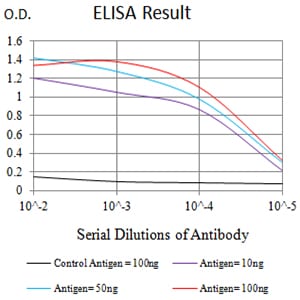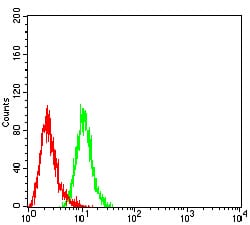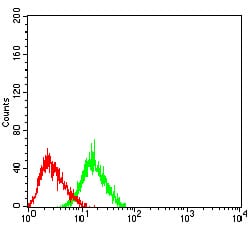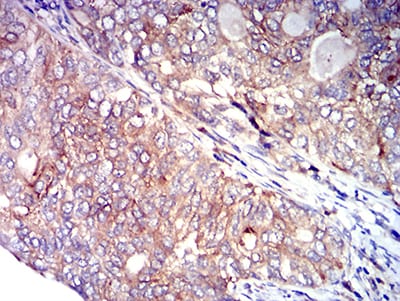



| WB | 咨询技术 | Human,Mouse,Rat |
| IF | 咨询技术 | Human,Mouse,Rat |
| IHC | 1/200 - 1/1000 | Human,Mouse,Rat |
| ICC | 技术咨询 | Human,Mouse,Rat |
| FCM | 1/200 - 1/400 | Human,Mouse,Rat |
| Elisa | 1/10000 | Human,Mouse,Rat |
| Aliases | TNFRSF4; OX40; ACT35; IMD16; TXGP1L |
| Entrez GeneID | 7293 |
| clone | 3G5G7 |
| WB Predicted band size | 29.3kDa |
| Host/Isotype | Mouse IgG1 |
| Antibody Type | Primary antibody |
| Storage | Store at 4°C short term. Aliquot and store at -20°C long term. Avoid freeze/thaw cycles. |
| Species Reactivity | Human |
| Immunogen | Purified recombinant fragment of human CD134 (AA: extra 29-214) expressed in E. Coli. |
| Formulation | Purified antibody in PBS with 0.05% sodium azide |
+ +
以下是关于CD134(OX40)抗体的3篇代表性文献的简要信息:
---
1. **文献名称**:*OX40 (CD134) is a potent costimulator for CD4+ T cells and can direct their activation to Th1 or Th2 subsets*
**作者**:Weinberg, A. D., et al.
**摘要**:该研究揭示了OX40抗体作为共刺激分子在CD4+ T细胞活化中的作用,证明其通过调控细胞因子分泌可引导Th1或Th2免疫反应分化,为免疫疗法提供理论依据。
2. **文献名称**:*Targeting OX40 in autoimmunity: Differential effects of OX40 agonism in murine models of multiple sclerosis and rheumatoid arthritis*
**作者**:Sugamura, K., et al.
**摘要**:研究探讨OX40抗体在不同自身免疫疾病模型中的作用,发现激动型抗体在多发性硬化模型中加重炎症,而在类风湿性关节炎中抑制关节损伤,提示靶向OX40需疾病特异性策略。
3. **文献名称**:*Structural basis of OX40 signaling mediated by antibody agonists and antagonists*
**作者**:Compaan, D. M., et al.
**摘要**:通过晶体结构分析,揭示了OX40与其抗体结合的表位及信号传导机制,为设计靶向OX40的激动剂或拮抗剂抗体提供了结构生物学基础。
---
以上文献涵盖基础机制、自身免疫治疗及抗体设计方向,均为该领域的经典或关键研究。如需更多信息,建议通过PubMed或期刊数据库查询具体文献。
CD134 (OX40), a member of the tumor necrosis factor receptor (TNFR) superfamily, is a cell-surface glycoprotein primarily expressed on activated CD4+ and CD8+ T lymphocytes. It plays a critical role in modulating immune responses by providing co-stimulatory signals that enhance T cell survival, proliferation, and effector function. CD134 interacts with its ligand OX40L (CD252), expressed on antigen-presenting cells, to amplify T cell activation and memory formation during inflammation, infection, or autoimmunity.
CD134-targeting antibodies have emerged as promising therapeutic tools in immunology. Agonistic anti-CD134 antibodies are explored in cancer immunotherapy to boost anti-tumor T cell responses, particularly in combination with checkpoint inhibitors. Conversely, antagonistic antibodies blocking CD134-OX40L interaction are investigated for treating autoimmune and inflammatory disorders by dampening pathogenic T cell activity. In veterinary medicine, CD134 also serves as a receptor for feline immunodeficiency virus (FIV), making its antibodies relevant in feline virology research.
Despite their potential, CD134 antibodies face challenges, including balancing therapeutic efficacy with immune-related toxicities. Structural studies reveal that antibody specificity for distinct CD134 epitopes influences functional outcomes (activation vs. inhibition). Ongoing research focuses on optimizing antibody engineering to improve target selectivity and safety profiles for clinical applications.
×